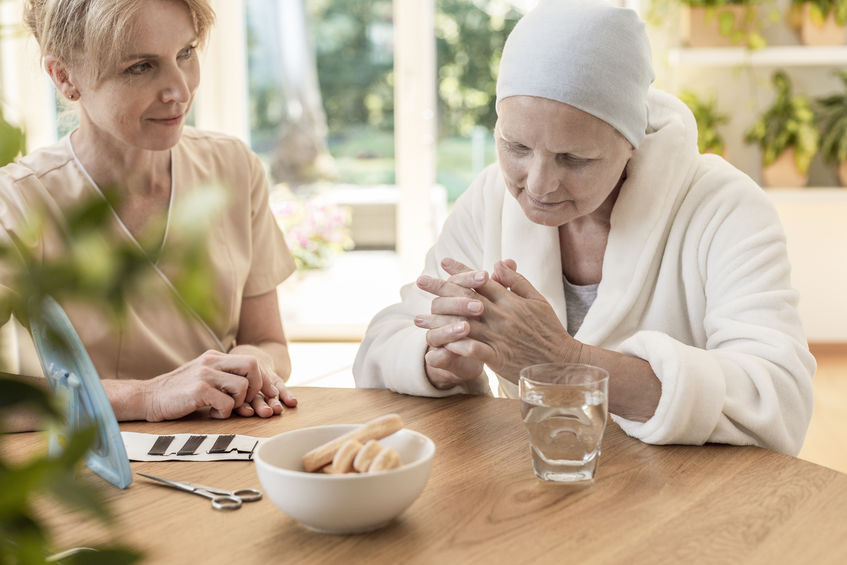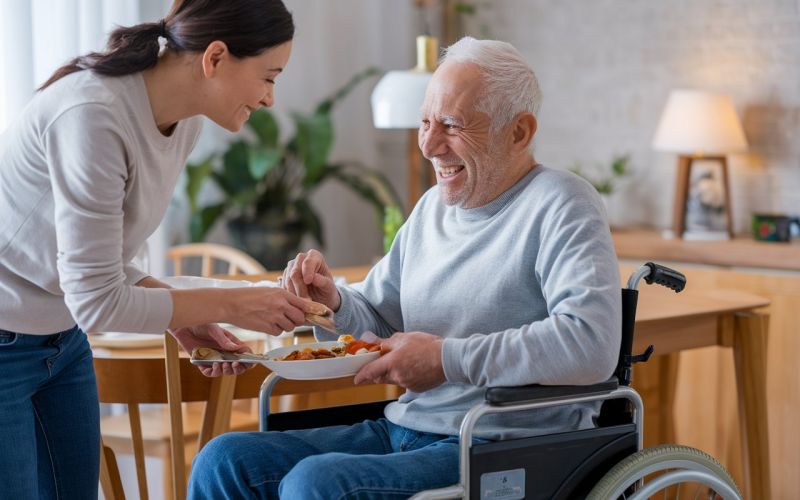Patient with Cancer: How Can You Help?
צוות iSavta | 13.11.2019

Cancer is a serious illness that has no cure up to this day. No matter which type of cancer it is, the care a patient needs is a cumulative effort among the physician, specialists, family members, and the caregiver. Numerous treatments may be tried by cancer patients and the results, in most cases, are unfavorable. People with serious illness, such as cancer, need care that is focused on relief of symptoms that cause distress to the cancer patient. They also need someone to tend to them all throughout their treatment and helping them get through the side effects.
Nausea and vomiting are very common to patients undergoing chemotherapy and radiation treatment. These unpleasant side effects of cancer treatment make it hard to get the nutrition the patient needs. The occurrence of nausea and vomiting can also cause fatigue, slow healing of wounds, loss of appetite, and weight loss. To help the patient deal with nausea and vomiting, the caregiver can ask about medicines that help prevent nausea and vomiting. The caregiver must also make sure that the patient is well hydrated to avoid worsening the side effects.
Fever is another common side effect of cancer patients getting chemotherapy. Chemo drugs not only attack cancer cells but also normal cells. Thus, patients undergoing such treatment have lower amount of white blood cells and are likely to get infections. As a result, the body reacts by heating itself up to fight off germs. Caregivers can help in monitoring the patient’s temperature by placing a thermometer in their mouth or in their armpit. They should also make sure that the patient takes medicine according to schedule. Since the immune system of the patient is low, caregivers should advise friends or family members who are also sick to talk to the patient only by phone instead of visiting. This would prevent the cancer patient from contracting other communicable diseases. Caregivers should also see to it that the patient drinks lots of fluids and get enough rest to restore the patient’s energy.
A person receiving cancer treatment may also experience skin problems such as itchiness, dry skin, and skin color changes. For a patient with dry skin, the caregiver can assist by putting lotion or oil to the patient’s skin especially those parts that are hard-to-reach. Itching, on the other hand, can cause restlessness and keep the patient awake. Aside from using creams for itching, the caregiver should bathe the patient in warm water and use mild unscented soap. The caregiver should also make sure that the patient avoids using scented or alcohol-based products on the skin. In washing the patient’s clothes and bedding, caregivers should try using mild and unscented detergents. To minimize skin damage from scratching, the caregiver should also advise the patient to use cotton gloves in their sleep. Furthermore, the house should be well ventilated to avoid the patient from sweating. On the other hand, skin color changes are visible to patients experiencing cancer treatment. The caregiver must gently clean the skin with mild soap, soft cloth, and warm water. He should also ensure that the patient apply medicines for skin reactions and protect the skin area affected from heat and cold. The caregiver can also give gentle massages using moisturizing lotions or creams to relieve the patient from discomfort caused by skin problems.
A pain control plan is also necessary for those cancer patients suffering from pain. The plan would depend on factors such as the patient’s diagnosis, type and stage of cancer, medications being taken, the patient’s response to pain, other health problems and personal choices. Cancer pain may result to patients having trouble sleeping and eating. They may also feel irritable to the people that surrounds them. As a caregiver, you may help the patient by primarily monitoring their intake of medicines for pain. You may also try warm baths or using warm cloth on affected areas but avoid areas where radiation was given. Giving the elderly a gentle massage can also help some types of pain. Giving the patient fiber-rich foods and healthy fluids can also aid in relieving pain. At times, suggesting enjoyable activities to distract the patient from pain may also be valuable. However, the key to soothing pain or discomfort really lies on how the patient describes the pain he is suffering from to begin with. This is very important because pain is easier to treat when it starts.
Cancer can also cause changes in the patient’s mood and form anxiety or depression. A person who finds out he has cancer itself could already lead to anxiety. Cancer patients have a lot in mind. They worry about the changes in the way they look, the uncertain future they have, and being a burden to others. Caregivers should be able to encourage but not force cancer patients to talk about their feelings. It is also important that the caregiver comforts the patient by listening carefully once they are ready to speak up about their fears and concerns. When listening, the caregiver must not give any hint of judgment to uphold the trust of the patient. Lastly, the caregiver can talk with the patient and decide together the kind of support each other needs.
In many cases, cancer continues to spread even if different treatments were conducted. This may be difficult for the patient, the family members, or the caregiver to accept. Cancer treatment is not a guarantee that the cancer will go away. Therefore, caregivers and family members alike should focus more on how to keep the patient comfortable and have a better life. Spending more quality time with a loved one experiencing a serious illness like cancer may just be what a cancer patient needs.












